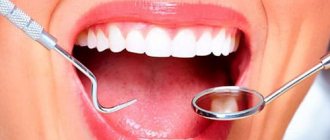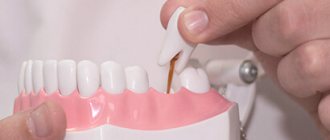Author of the article: Gadzhiev Ruslan Abasovich
Doctor-expert
Specialization: Dentist-therapist
Total work experience: since 2011
Reading time: 7-8 minutes
Tooth decay in general, and crumbling in particular, is not an aesthetic problem. In some cases, decaying teeth can be the result of not only dental, but also other types of diseases. To understand the topic and know why teeth crumble, what to do and which doctor to contact, you need to study all the important details.
Why teeth crumble - the main reasons and factors
Various types of tooth decay can be influenced by natural, mechanical and other factors. Sometimes this is a consequence of the neglect of some dental problem, and in other cases it is the result of the appearance of common diseases. Conventionally, all factors that can cause tooth decay are divided into three groups:
- External
:- Mechanical impact
. Strong clenching of the jaws, biting off hard objects, injuries - this is not a complete list of reasons that can lead to mechanical injury to the teeth. If the result is a violation of the integrity of the enamel, then the risk of not only the development of infections, but also the appearance of deformation increases. - Temperature
. The temperature of the foods you eat directly affects the condition of your teeth. Excessively hot or very cold dishes lead to the appearance of microcracks through which pathogenic bacteria penetrate, causing destruction/crumbling. - Chemical exposure
. Concentrated chemicals negatively affect the health of enamel. For example, its protective properties are significantly weakened by regular consumption of sour citrus fruits. - Improper oral hygiene
. This can be either individually incorrectly selected teeth cleaning products or irregular hygiene procedures. As a result, there is an accumulation of microbes that are destructive and will inevitably cause a number of diseases, including gums. - Domestic
:- Bad heredity
. Unfortunately, this is one of the factors that cannot be controlled. The tendency of teeth to decay, for example, due to thinned enamel, can be inherited and manifest itself at any period of a person’s life. The main task in this case is to slow down the destruction processes and focus on preventive measures. - Unbalanced diet
. In this case, a real chain reaction is triggered - the lack of a well-structured diet leads to metabolic disorders, resulting in a lack of useful vitamins and microelements necessary to strengthen the gums and enamel. As a result, for example, if teeth crumble, the reasons are a lack of fluoride and calcium and, as a consequence, thinning of dentin. - Hormonal instability
. Disruption of the endocrine system is one of the reasons for the development of caries, and its appearance is the first step towards tooth destruction. - Regular use of drugs
. Some therapeutic procedures and medications reduce the intensity of saliva production, which, accordingly, leads to negative consequences. - Chronic diseases
. Weakened immunity, for example, due to diagnosed oncology, hypertension, gastrointestinal disorders, etc. always negatively affects the condition of the teeth. - Vitamin deficiency
. To maintain healthy teeth, gums and the oral cavity in general, a person must consume sufficient quantities of vitamins B, C, E and D. Their absence in the diet or the inability to fully absorb them can lead to crumbling. - Bad habits
:- snacking on foods with excess sugar (lead to the formation of plaque, which destroys the enamel layer);
- biting third-party objects, for example, a pen/pencil, thread, wire, etc. (leads to mechanical damage);
- bruxism (night grinding of teeth leads to their abrasion and destruction);
- frequent consumption of drinks that affect enamel pigmentation (for example, coffee, red wine, carbonated drinks with artificial food colors);
- frequent whitening using folk remedies (increases sensitivity, has a detrimental effect on teeth in general);
- smoking (weakens the immune system and reduces the absorption of vitamins, which can cause vitamin deficiency).
The reason why teeth crumble may be one or several of the factors listed above. Be prepared that in order to solve the problem you will have to contact not only the dentist, but also reconsider your lifestyle, nutritional culture and oral hygiene habits.
What to do if your teeth start to crumble badly
The first thing you need to do is make an appointment with a dentist and come to the appointment. The doctor will conduct an in-person examination and determine the cause of the pathology. Further actions will directly depend on the provoking factor.
If it's all about caries, then it will be filled. To do this, the hole will be closed with modern filling material , which will qualitatively strengthen the walls of the crown. The patient will be told how to properly care for their oral cavity to avoid illness in the future.
If the defect occurs due to mineral deficiency, remineralization is carried out. During the procedure, the crown is treated with a special composition enriched with calcium, phosphorus and other useful compounds. Afterwards, a composite or ceramic veneer is installed to hide the chip.
If you have fluorosis, you should stop using water with a high fluoride content. Existing irregularities can be corrected using dental crowns or inlays. For minor damage, veneers and lumineers will help.
Diagnosis and identification of the cause
Teeth crumbling is a consequence, but only a specialist can determine what the root cause is. It will take one or more appointments (depending on whether additional tests are required) to understand whether dental or some other reason led to the appearance of crumbling.
The diagnostic examination takes place in several stages:
- examination of the patient’s oral cavity to collect a detailed medical history;
- if the reason is not dental, then a recommendation is given to visit a doctor according to indications, for example, an endocrinologist, therapist, gynecologist, etc.;
- a referral is issued for blood tests (to identify possible pathologies, such as anemia, hormonal disorders, etc.).
Often, x-rays, ultrasound and other tests may be required. The more thoroughly information about your health status is collected, the higher the chance that the cause of tooth decay will be eliminated and it will be possible to save those that are not yet affected.
You might be interested in:
Online consultation
Dental restoration
Treatment of caries
Cervical caries
Prevention of injuries to baby teeth
- If possible, stop the child’s attempts to try everything by heart.
- Teaching your child how to properly brush their teeth.
- Children's toothbrush with soft bristles.
- A nutritious diet with sufficient calcium and fluoride.
- Regularly remind your child about the dangers of chewing pens and pencils.
- Carry out deworming periodically, especially if there are pets in the house.
- Visit your dentist in a timely manner to correct your bite.
- Treat initial caries (at the spot stage) immediately.
- Have a dental examination every year.
If a child has a broken baby tooth, the dentists at the First Family Clinic of St. Petersburg will carefully examine and, if possible, restore the damaged crown. We guarantee excellent aesthetic results. Your child will quickly forget about the injury.
What to do with already crumbled teeth?
Whatever the reason, but if the fact of crumbling has already happened, you need to worry about the issue of restoration. Dental procedures in this case can be carried out in parallel with the elimination of the cause of teeth crumbling.
Recommended options for restoring crumbling teeth:
- Artistic restoration or filling
. Suitable for cases where a small area is crumbled and the resulting cavity is not affected by caries. Photopolymer materials are installed in place of the missing piece of fabric. - Prosthetics
.
The appropriate option is selected individually. The dentist may offer you: Veneers
. If the destruction has affected only the front part of the tooth and is purely aesthetic in nature, a ceramic onlay will help correct the defect. - Crowns
. If the tooth has crumbled very badly, then crowns made of metal-ceramics, ceramics or zirconium dioxide can be used for restoration. - Tabs
. They allow you to restore the destroyed part by replacing the missing tissue.
. It involves the implantation of an artificial root into the bone tissue, on which a crown is then installed. The method is indicated for those whose tooth could not be saved, which led to its complete loss.
Only a dentist can determine the optimal method for restoring crushed parts, and already at the first examination. Please note that if the problem is not addressed immediately, it may worsen and lead to complete tooth loss.
Why do children's teeth crumble?
Sometimes children experience tooth fragility due to a difficult pregnancy and difficult birth of the mother. But most often, a child’s teeth crumble due to a large amount of sweet or sour foods in the diet and poor oral hygiene. In addition, active children sometimes get injured, damaging their teeth, which can subsequently lead to their destruction. Therefore, visiting the pediatric dentist should be a good habit to keep children's teeth healthy.
Prevention of tooth decay
Already knowing why teeth crumble, it’s easy to draw logical conclusions about what you should give up and what you should take up as a habit as preventive measures. But, in fact, the list of recommendations for well-organized prevention is quite large. The main tips concern the following issues:
- Professional cleaning
. It is carried out to remove plaque and stone. - Remineralization
. It is carried out with the aim of restoring and normalizing the balance of vitamins in the dental tissues. To saturate the tissues with the necessary elements, a special composition is applied to the surface of the tooth for several minutes. After enrichment with fluorine and calcium, the fabric becomes stronger. - Fluoridation
. The use of fluoride-containing pastes that actively nourish the enamel. It is fluoride that is responsible for crystalline calcium compounds and helps strengthen teeth. - Taking active supplements
. With a predominance of calcium and vitamin D. - Rejection of bad habits
. Both in nutrition and in other aspects, for example, refusing to bite your nails. - Revision of the diet
. Regular consumption of seafood, fresh vegetables, fruits and cottage cheese is encouraged. - Rinse
(with water or special compounds). Recommended after every meal and snack. - Routine visit to the dentist.
Even if you have no complaints, it is recommended to schedule an examination at least twice a year.
Also try to avoid stress and walk outdoors more often. In addition, it would be a good idea to consult with your doctor about choosing the toothpaste that is best suited for you. And also purchase a soft brush, rinsing compositions and floss for cleaning the interdental space. Their regular use will be an excellent prevention.
The main reasons for the fragility of dental crowns
What became the root cause of the processes that destroy teeth can only be determined by a dentist. His arsenal includes diagnostic studies and clinical experience, thanks to which it is customary to identify the following factors that cause teeth to crumble:
- Dietary disorders. It is not a myth that excessive consumption of sweets destroys tooth enamel. In a sweet environment, microbes that cause caries multiply with great intensity. Therefore, it is recommended to drink a lot of liquid so that the saliva is not thick, viscous and has a good antibacterial function. The fewer simple carbohydrates in your diet and the more foods containing calcium and vitamin D, the better for your teeth.
- Poor hygiene. It is obvious here that insufficient brushing of teeth and removal of food debris from the oral cavity leads to a massive proliferation of microorganisms that cause caries.
- General condition of the body. Chronic diseases often cause tooth fragility. Most often these are problems in the endocrine system (diabetes). In addition, the natural and completely healthy state of pregnancy can also cause problems with teeth due to metabolic disorders in the body of the expectant mother.
- Anatomical disorders in the structure of teeth and jaw. In case of malocclusion pathologies or violations of the integrity of the dentition, disturbances in the distribution of loads during chewing are observed, which leads to premature wear of the enamel, cracks, and chipped teeth.
- Ecology. Often, the condition of a person’s teeth reflects the quality of the water that he drinks, indicates the presence of high levels of radiation and the content of chemicals in the air.
- Rare visits to the dentist. A specialist will always notice dental problems at an early stage and will not allow a process to start that will destroy the teeth. If you visit the doctor more often, you will have to treat your teeth less often, since regular dental examinations prevent the occurrence of serious pathologies that require long and painful treatment.
Separately, it is worth highlighting wisdom teeth, which already at the beginning of their growth can be fragile due to their unfortunate location, pathological growth and other reasons.
Features of nutrition with increased fragility of enamel
If the problem of teeth crumbling is purely dental, then most often it is a consequence of thinning and brittleness of the enamel. If you solve the problem solely aesthetically, your teeth will continue to deteriorate. The most correct option is to follow the nutritional recommendations, observing two basic conditions:
- Normalize the functioning of the gastrointestinal tract (for complete absorption of mineral salts).
- Ensure the supply of essential minerals and vitamins from food and more.
Make it a habit to eat 5-6 times a day, eating small portions of food each time. Avoid foods that are difficult to digest and harmful (including processed foods).
Try to regularly consume foods rich in:
- Phosphorus
: eggs; - high-quality natural cheeses;
- nuts;
- sesame;
- pumpkin and sunflower seeds;
- greenery;
- seafood;
- beef and veal.
:
- fish (in particular sardines and herring);
To ensure the necessary chemical reactions, it is very important to consume clean water regularly and in sufficient quantities. For an adult, the norm is 1.5-2 liters per day.
Treatment methods
The very first thing to do is to clean the canals - in the absence of a crown, carious inflammation can very quickly spread to a nearby nerve. After this, it is necessary to begin restoring the coronal part, i.e. the very top of the tooth. There are several best options for this.
Installation of a stump inlay A stump inlay is a modern alternative to pin-based extensions. A pin is simply a metal rod, while an inlay is created individually and accurately replicates the structure of the root system of a particular tooth. The result is a longer service life of both crown and root, as well as superior esthetics.
Price:
from 5,000 rubles more details about the solution
Installing a crown If the crown is destroyed to the level of the gingival margin, it is impossible to install only a filling - you need to think about prosthetic crowns. But such prostheses need support; the best option is to install a stump tab, which will strengthen the root system and create support for the prosthesis. Ceramic crowns are better suited for the front teeth, and metal-ceramic crowns for the side teeth. In both cases, an excellent solution would be zirconium dioxide prostheses - strong, aesthetic and very durable.
Price:
from 11,000 rubles more about the solution
Dental implantation This method is advisable to use when saving a tooth is not possible. And it is best to install the implant immediately after root removal. Thus, the preservation of bone tissue and its protection from rapid atrophy will be ensured. In some situations, especially when it comes to prosthetics of the front teeth, a crown can be placed on the implant immediately, which will restore the aesthetics of the row.
Price:
from 35,000 rubles more about the solution
Brief conclusions
If you notice that your teeth are crumbling, but do not experience pain, this is not a reason to delay going to the dentist. Get ready for the fact that the problem that has arisen will have to be solved comprehensively, turning to doctors of various profiles and solving not only dental, but also other health problems. If your teeth are crumbling, the causes can only be determined and eliminated by a specialist.
And most importantly, do not neglect preventive measures that will help maintain the integrity of your teeth and healthy gums.
How can a dentist help?
Depending on the degree of tooth decay, stage and causes of fragility, as well as taking into account the natural appearance of the dentition, the doctor selects treatment methods:
- Installation of fillings - used when the tooth has crumbled slightly and it is possible to restore it completely.
- Veneers - ceramic onlays will be the solution if the front tooth has crumbled and it is impossible to restore it to its original aesthetic state.
- Inlays – if a chewing tooth is destroyed by 50%, inlays will help; their advantage is that they are more durable and airtight than fillings and can withstand loads well.
- Crowns – if the crown part of the tooth is completely destroyed, prosthetics with crowns are necessary.
- Removal and implantation - if the tooth is crumbled and the tooth root is also almost destroyed, it is removed, and then implantation is carried out and a crown is put on.
Our dentist will select a method based on the individual characteristics of the teeth, their location and condition. It is worth noting that regular visits to our clinic reduce the risk of tooth decay. Visit your dentist at least once a year for a professional examination to avoid serious diseases and complex long-term treatment for them.
Read also
What is dental restoration
If the aesthetic properties of teeth are lost, a person experiences certain discomfort.
What to do if your tooth aches
Sometimes aching pain in a tooth can appear for no apparent reason at first glance.










